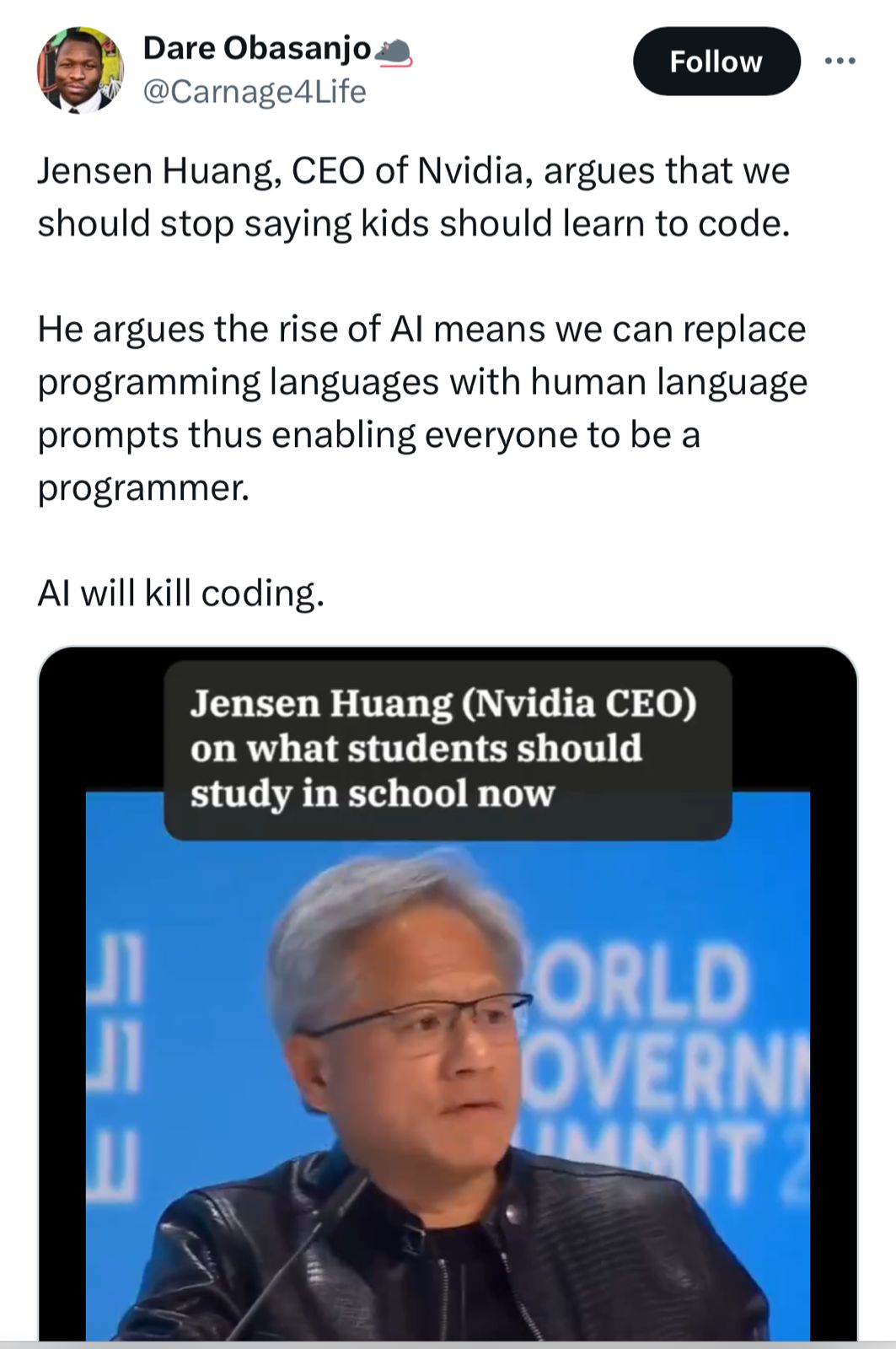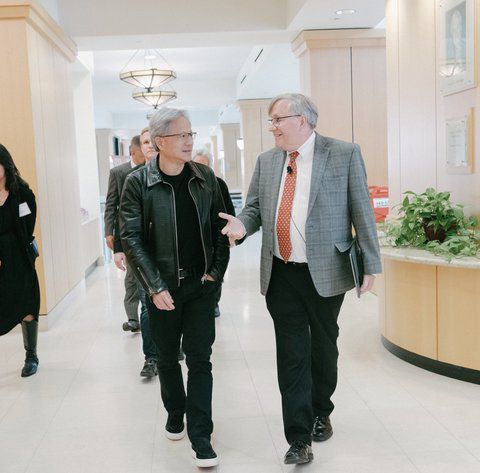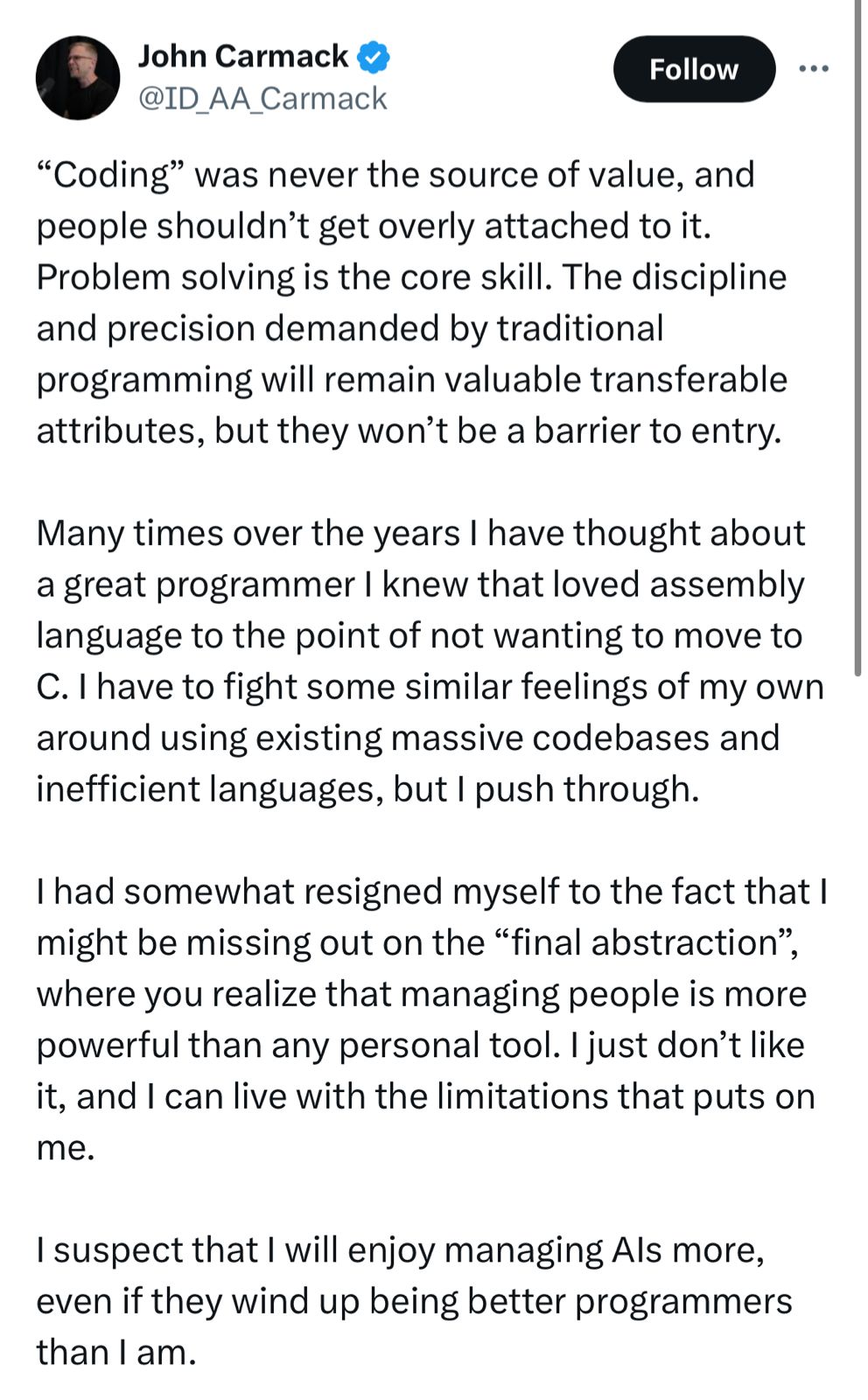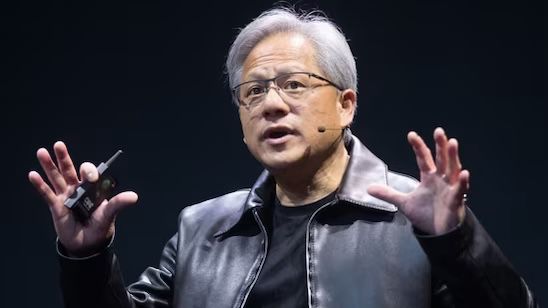Highlights
- Nvidia CEO Jensen Huang suggests AI should take over coding, making traditional programming languages obsolete.
- Critics argue coding teaches critical thinking and problem-solving skills essential beyond programming.
- Tools like ChatGPT indicate AI’s potential to handle complex coding tasks, hinting at job transformation rather than elimination.
- Emphasis on AI literacy could enhance tech industry inclusivity, but human oversight remains crucial.
At the recent World Government Summit in Dubai, Nvidia CEO Jensen Huang posited that children should not be encouraged to learn coding, suggesting instead that this responsibility should be handed over to artificial intelligence (AI).
Huang articulated a vision for the future in which AI’s capabilities could make traditional programming languages like Java and C++ redundant, arguing that computers should understand instructions in human language, thereby democratizing programming and making “everyone a programmer” through AI.

Is he right?
Has AI evolved so much that basic coding knowledge is no longer needed for students because the AI is inherently going to do it better than them?
Does this appear as the death of the coding job industry at large?
There are a lot of ethical conundrums to Huang’s statement here.

“Over the last 10-15 years, almost everybody who sits on a stage like this would tell you that it is vital that your children learn computer science, everybody should learn how to program. In fact, it is almost exactly the opposite. It is our job to create computing technology such that nobody has to program, and that the programming language is human. Everybody in the world is now a programmer. This is the miracle of AI,” Huang said.
John Carmack, who is the former CTO Oculus VR said “Coding was never the source of value, and people shouldn’t get overly attached to it. Problem-solving is the core skill. The discipline and precision demanded by traditional programming will remain valuable transferable attributes, but they won’t be a barrier to entry,” he said in an X post responding to Huang’s video. “I suspect that I will enjoy managing AIs more, even if they wind up being better programmers than I am,” he added.
Let’s explore what it could signify.
Validity of Huang’s Statements

Critics and supporters alike have weighed in on Huang’s vision.
John Carmack, the former CTO of Oculus VR and a well-known figure in the tech world, supported Huang’s view by emphasizing that the core value lies not in coding itself but in problem-solving.
Carmack suggests that while the discipline and precision required by traditional programming will remain valuable, they should not be barriers to entry in the tech field.

Tools like OpenAI’s ChatGPT have demonstrated the potential to write and debug code, showing us a future where AI could handle increasingly complex programming tasks.
However, critics argue that learning to code develops critical thinking, problem-solving skills, and an understanding of the digital world that goes beyond merely instructing a computer.
While AI can automate tasks, the human ability to innovate, think critically, and understand complex systems remains essential.
The emphasis should perhaps be on integrating AI literacy into education rather than eliminating coding from curricula.
Long-Term Prospects of AI Taking Over Coding Jobs

- Job Transformation, Not Elimination: The advent of AI in programming does not necessarily equate to the eradication of coding jobs. Instead, it suggests a transformation. Programmers might shift towards more strategic roles, overseeing AI-generated code, ensuring quality, and integrating human insights with AI capabilities.
- New Opportunities and Challenges: As AI automates routine coding tasks, it could open up opportunities for professionals to focus on more complex, creative, and strategic aspects of software development. However, this shift also presents challenges, including the need for ongoing education and adaptation to new tools and methodologies.
The Broader Impact on the Tech Industry

Accessibility and Inclusion are going to have a big impact on AI. By making programming more accessible, AI has the potential to enhance participation in the tech industry, breaking down barriers related to education, background, and skill level.
This could lead to a more diverse and innovative field.
Even so, there is of course the undeniable fact that relying on AI for coding raises questions about ethics, quality, and reliability.

As such any kind of AI-generated code must be scrutinized for biases, errors, and security vulnerabilities, underscoring the ongoing need for human oversight.
There is still some time before AI can completely right fluent code based on some textual prompts.
However, we are getting there faster than we would like and the hope is that the education system keeps up with it.

FAQs
What did Nvidia’s CEO say about children learning to code?
Jensen Huang, CEO of Nvidia, suggested that the responsibility of coding could be handed over to AI, proposing a future where traditional programming languages become redundant as computers could understand instructions in human language.
How do critics respond to the idea of AI replacing basic coding knowledge?
Critics of Huang’s vision argue that learning to code is crucial for developing critical thinking, problem-solving skills, and understanding the digital world, skills that AI automation cannot replace.
Can AI really take over coding jobs?
While AI like ChatGPT shows promise in writing and debugging code, the consensus is that AI will transform coding jobs rather than eliminate them. Professionals may move towards roles that blend human insight with AI capabilities.
What are the long-term prospects of AI in programming?
Long-term, AI is expected to automate routine coding tasks, potentially making programming more accessible and inclusive, yet emphasizing the need for human oversight to ensure ethics, quality, and reliability.
What are the implications of AI taking over coding for the tech industry?
AI’s role in coding could democratize programming, lowering barriers to entry and fostering a more diverse tech industry. However, it raises ethical questions and highlights the importance of quality control and security.
Also Read: Artificial Intelligence And Its Applications In The Real World?
Also Read: Here’s How an Artificial Intelligence Works
Also Read: Artificial Intelligence Unit (AUI) Introduced by IBM; Details Inside
